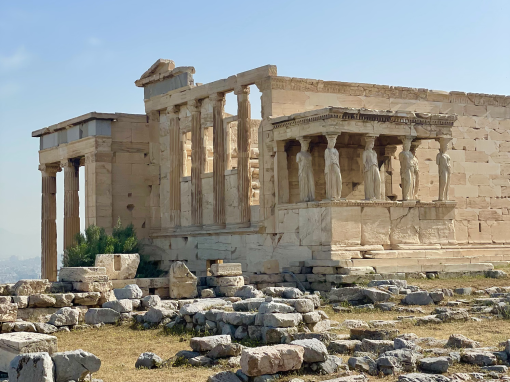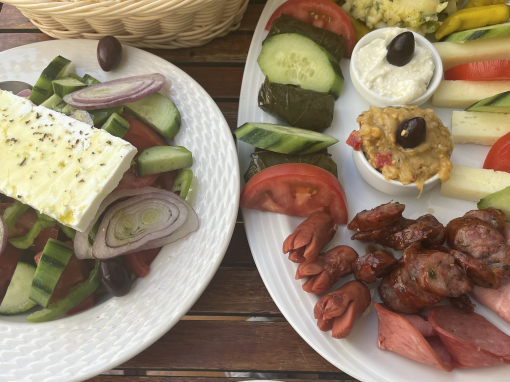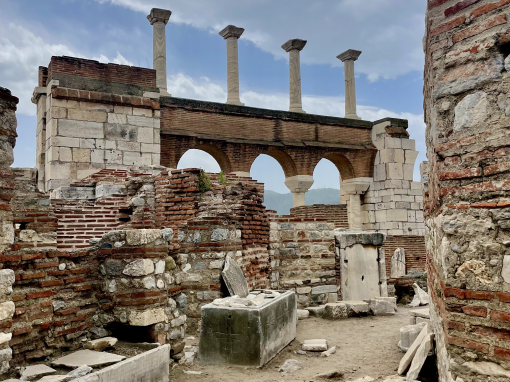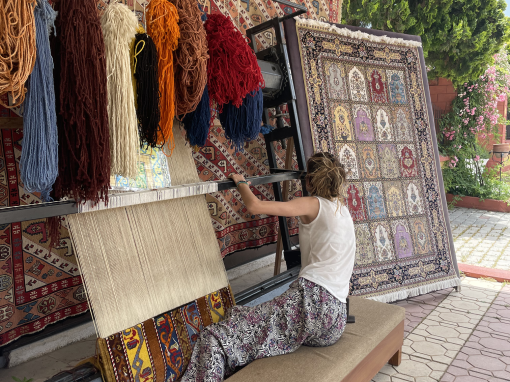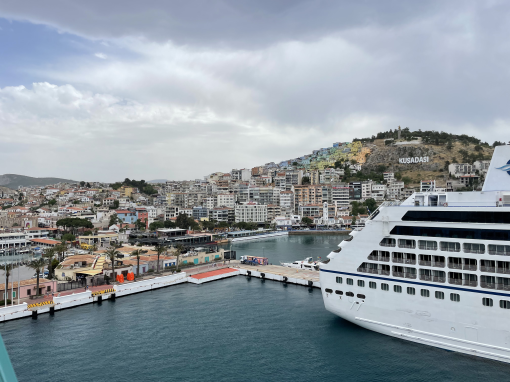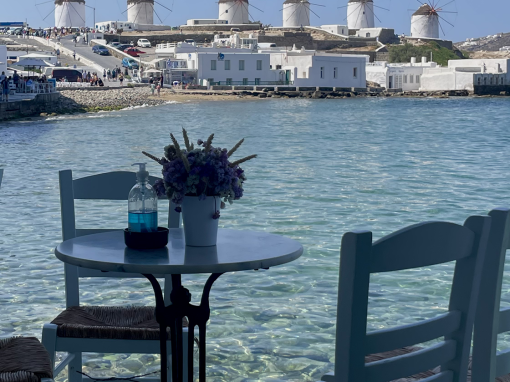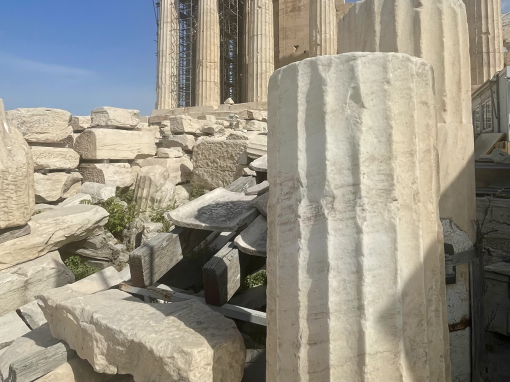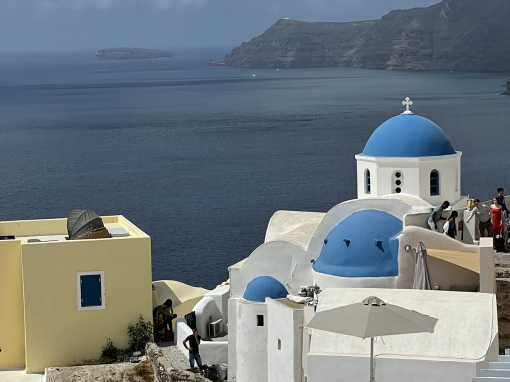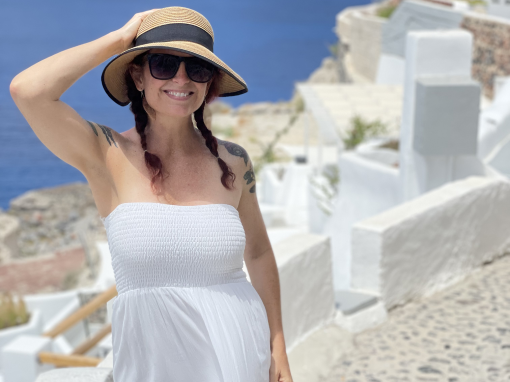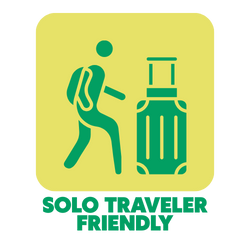



*Prices include airfare, lodging, ground transportation, meals, activity fees, and more.
*Any exceptions are clearly disclosed in the application.
Day 1: Overnight Flight
Depart from USA.
Day 2: Athens
Arrive in Athens, meet your Tour Guide and begin to explore this enchanting, ancient city. Perhaps stop for a plate of honey-soaked, cinnamon-spiced loukoumades while you stroll through the winding streets of this cradle of civilization.
Day 3: Cruise
Board your cruise ship in the morning and settle into your outside cabin. After a late-morning sailing from Lavrion, drop anchor in the afternoon on Mykonos, the dazzling white island with a jet-set atmosphere. View windmills, whitewashed houses and the rugged shoreline of coves and grottoes. Spend an enjoyable evening ashore.
Day 4: Cruise
Dock today at the Turkish port and resort town of Kusadasi and travel inland to Ephesus to tour a complete ancient city. Walk down the marble road still grooved by chariot wheels and see the intact façade of the Library of Celsus and great Temple of Serapis, as well as the stadium, theater, baths and more. Sailagain in the afternoon and dock at tiny, sparkling white town of Patmos. Visit the sprawling castle-like Monastery of St. John and the Cave of the Apocalypse before returning to the ship.
Day 5: Cruise
Sail to Rhodes and enjoy a full day ashore the island that Romans called the Bride of the Sun. A guided walking tour of the walled Knights’ Quarter immerses you in the island’s medieval history and the legends of the Knights of the Order of St. John of Jerusalem (or Knights Hospitaller). See highlights such as the Street of the Knights and the old Hospital of the Knights building, then visit the splendid Palace of the Grand Master before also viewing the Mosque of Süleyman, Turkish Baths and the Church of Our Lady of the Castle. You’ll have time for swimming in the crystal clear waters of the Aegean Sea or soaking up more of the island’s culture at your own pace before an early evening sailing.
Day 6: Cruise
Dock at Heraklion, the capital of Crete, and take a guided tour of the 5,000 year-old Minoan Palace of Knossos. Then sail to stunning Santorini, which many believe is part of the fabled lost continent of Atlantis. Transfer to shore and board your bus to explore the island. Start by soaking up the distinctive character of Megalochori, continue through traditional communities like Firostefani and Imerovigli, and enjoy unsurpassable panoramic views of the lace-like caldera and little islands to the west before arriving in Oia village, perched on the rim of the caldera. You’ll have time to explore Oia’s traditional buildings, marble-paved alleys, local shops, and more at your own pace before returning to the ship.
Day 7: Athens
Arrive back in Lavrion to disembark from your cruise ship and enjoy a guided morning sightseeing tour that reveals the glory of Greece. Ascend the Acropolisfor a visit to the Parthenon see the Agora and stroll through the Acropolis Museum, a modern architectural jewel. Then the afternoon is free to take snapshots from atop Mount Lycabettus. Tonight you’ll be thoroughly entertainedby a Greek cultural evening at a classic taverna in the Plaka area. Dine onauthentic taverna cuisine, feast your eyes and ears on professional dancers moving to traditional live music, and have a smashing good time! An expert alsoteaches you the steps of traditional Greek dances so that you can join in the fun.
Day 8: Athens
A scenic drive through vineyards and olive groves brings you to Delphi, the center of the universe for ancient Greeks. A local guide shows you the ancient site where ancient Greeks asked for counsel from its fabled oracle. Visit the Temple of Apollo and the Delphi Archaeological Museum, featuring artifacts unearthed during local excavations, before you return to Athens for your final evening abroad.
Day 9: Departure
Depart for the USA.
UNITED NATIONS SUSTAINABLE DEVELOPMENT GOALS

Sustainable Development Goal 4 - Quality Education
Students learn through experiential education: guided tours, museums, ancientsites, and interactive cultural evenings. Connections to classical civilization, early Christianity, democracy, art, and mythology.

Sustainable Development Goal 11 - Sustainable Cities and Communities
Visits to UNESCO World Heritage Sites (Acropolis, Delphi, Ephesus, Rhodes,Meteora, etc.) highlight the importance of cultural preservation.
Emphasis on heritage tourism and protecting historic sites for futuregenerations

SUSTAINALBE DEVELOPMENT GOAL 12 - RESPONSIBLE Consumption and Production
Exposure to the Mediterranean diet and sustainable farming traditions (olivegroves, vineyards, fresh local foods).
Learning about local economies dependent on sustainable tourism andagriculture

Sustainable Development Goal 16 - Peace Justice & Strong Institutions
Exploring the birthplace of democracy in Athens and learning about ancient legal systems. Visits to religious and civic sites that shaped governance, law, and ethical traditions.

Sustainable Development Goal 17 - Partnerships for the Goals
Cross-cultural exchange opportunities with local guides, communities, and faith-based sites. Students practice global citizenship and build understanding across cultures.
EDUCATIONAL AND CULTURAL CONNECTIONS
Arts, A/V Technology & Communications
Photography, videography, and digital storytelling opportunities at iconic sites (Acropolis, Santorini, Ephesus). Exposure to ancient art and architecture (Parthenon, Knossos Palace, Delphi Museum). Developing cultural communication skills through guided tours and interactions.
Hospitality & Tourism
Real-world insight into the tourism industry via cruise travel, guided tours, museums, and local cultural experiences. Learning how destinations market themselves (Athens vs. Mykonos vs. Santorini). Exploring heritage preservation and sustainable tourism practices.
Agriculture, Food & Natural Resources
Experiencing Greek agriculture firsthand—olive groves, vineyards, and Mediterranean farming traditions. Understanding farm-to-table cuisine in tavernas (olive oil, honey, seafood, fresh produce). Tasting and discussing the health benefits of the Mediterranean diet.
Law, Public Safety, Corrections & Security
Exploring the origins of democracy and law in Athens and the Agora. Learning about justice and governance in ancient and modern contexts. Seeing how religious and civic structures shaped societies.
Human Services (Religion & Social Studies focus)
Walking in the footsteps of Paul (Athens, Corinth, Ephesus, Patmos). Reflecting on how early Christianity spread through Greece and Turkey. Faith-based experiences like the Monastery of St. John and Cave of the Apocalypse.
Culinary Arts
Hands-on learning through sampling traditional Greek foods: loukoumades, souvlaki, baklava. Understanding cultural identity through cuisine. Learning how geography and history shaped Greek food traditions.
Marketing, Business & Finance
Observing how Greece brands itself as a global travel destination. Seeing economic impacts of heritage tourism and cruises. Comparing local markets and modern shopping (Plaka district, island shops).

